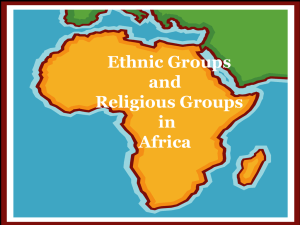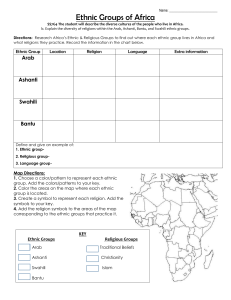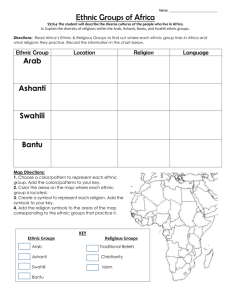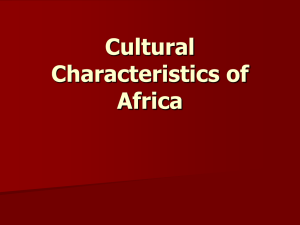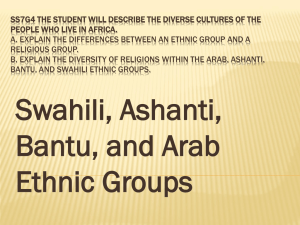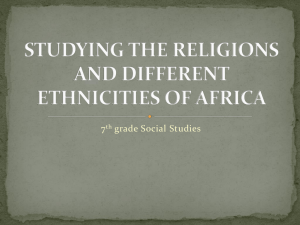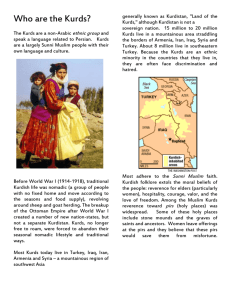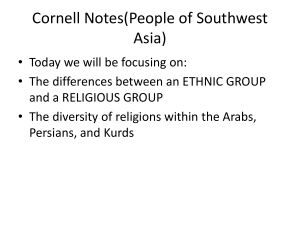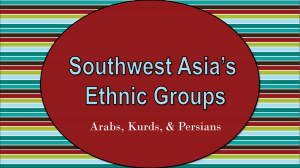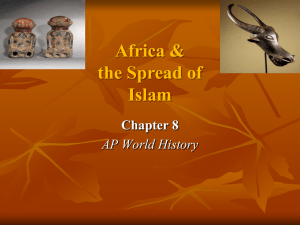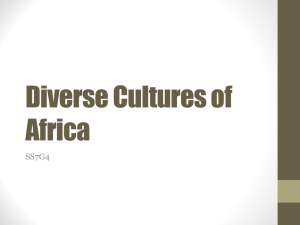Ethnic Groups and Religious Groups Africa
advertisement
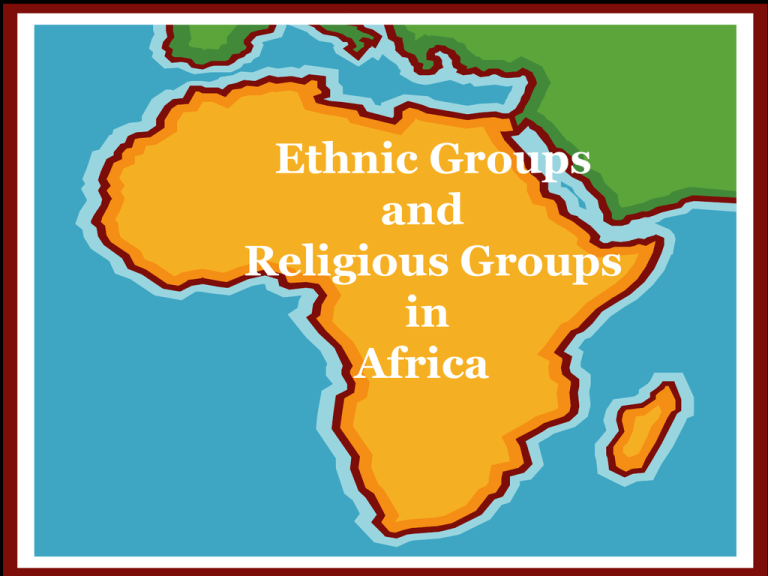
Ethnic Groups and ` Religious Groups in Africa What are the differences between ethnic groups and religious groups? Ethnic groups share – language physical features customs traditions Religious groups share common belief systems BUT are not necessarily a single ethnic group. For example: Arabs may be Muslims or Christians. Which concept relates to religion rather than ethnicity? A. Kimba is Ashanti. B. Mustafa follows the Quran. C. Kemal is a nomadic herder. D. Jambo speaks Swahili. Shara is Arab. Why can’t it be assumed that Shara is Muslim? A. All Arabs are not Muslim B. All Arabs are Christian C. Muslims are not Arab D. Christians are not Arab *The main ethnic groups found in Africa are: Arabs Ashanti Bantu Swahili What religion do the different ethnic groups belong to? Many religions are found throughout Africa. There are Muslims, Christians, and followers of traditional religions. *A traditional religion follows a mixture of spiritual and supernatural powers. In some cases these traditional beliefs are combined with Christianity. Arabs may be Muslims or Christians. However in Africa, Islam is predominate. Ashanti follow traditional religions. They believe that plants, animals, and trees have souls. They also believe in fairies, witches, and forest monsters. Bantu follow a traditional religion. They believe in the power of their ancestors. Swahili are followers of Islam with traditional elements. *Arabs Islam or Christian, mostly Islam *Ashanti – traditional religions *Bantu - traditional religions, believe in power of ancestors *Swahili – Islam with traditional elements Where do the people live? *Arabs are found in North Africa. *The Ashanti live in West Africa. *Bantu live in Central Africa and migrated to the area around the Congo River. They eventually migrated east to Kenya and south to South Africa. *The Swahili were found in East Africa, where they merged with Arabs. Now they are a mixed group from many backgrounds. They converted to Islam as early as 7th century A.D. Putting it all together Where do the ethnic groups live? The majority of people in North Africa are Arabs. Write ARAB on your map in North Africa. What makes Arabs an ethnic group? Arabs have common ancestry. Arabic is the official language. Write SPEAK ARABIC on your map. Most Arabs follow the same religion – Islam. Write = ISLAM on your map. Extended families are common. Children and parents share a house with grandparents, aunts, uncles, and cousins, in an extended family. On your map, write Extended Family in North Africa. Families have fewer children here. Write 2-4 children on your map. 2/3 of North Africans live in urban areas. Write Mainly Urban on your map. Sub-Saharan Africa There are hundreds of different ethnic groups. On your map BELOW the Sahara, write Many Ethnic Groups. When Africa was ruled by colonial powers, European languages became the official languages of sub-Saharan countries. Most kept European languages as official languages after independence. Write Speak French, English, or Portuguese on your map. Along the equator many people speak a common language – Swahili. It is a blend of native languages, Arabic and Portuguese. Write Speak Swahili next to the equator. Each ethnic group has its own religion. However, Arab traders introduced Islam to the area directly under the Sahara. European missionaries and colonists also introduced Christianity. Under the Sahara write Local Religions Arab influence= Colonial influence = Most people live in small farming villages. Some areas are urban, such as Lagos, Nigeria. Write Some areas urban on your map. Over 2/3 of the people live and work in rural areas. Write Mainly Rural on your map. Many people in farming villages have large families. In rural areas the family and village all help raise the children. Write Village family 4-7 children on your map.
